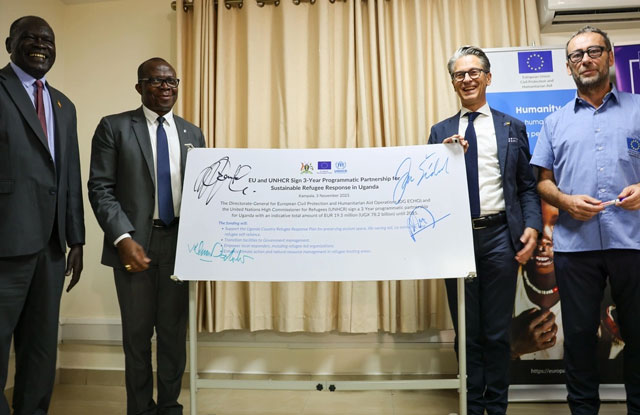
Kampala, Uganda | THE INDEPENDENT | The European Union (EU) has signed a three-year partnership with the United Nations High Commissioner for Refugees (UNHCR) towards the refugee response in Uganda.
The multi-year program partnership is worth sh78.2 billion, part of which, the European Union (EU) has this year allocated sh26 billion.
Matthew Crentsil, the UNHRC Representative says that this partnership is the first of its kind to be undertaken with the EU and signals an era of collaborative action between the EU’s Humanitarian Aid Office (ECHO) and the UN’s Refugee Agency, in support of displaced people.
Since the beginning of 2022, more than 200,000 refugees have arrived in Uganda and these are in addition to 1.5 million refugees who have already sought protection in the country.
Uganda promotes an open-door policy allowing refugees mainly from neighboring countries to access security, health, education, and other services as well as work and create businesses.
“The contract we are signing with UNHCR today illustrates our commitment over time. If you allow me to use a bit of jargon – we call it a programmatic partnership. This is a multi-annual program allowing our partner to have predictability in their funding. It reinforces the possibility to plan and make the Ugandan World’s Model for refugee response more sustainable,” says the EU Ambassador, Jan Sadek.
Bruno Rotival, the Head of the EU’s Humanitarian Aid office says that the flexible funding within a longer timeframe will allow UNHCR to develop innovative policy approaches, more effective service delivery, and improved local capacity.
EU also says that the funding is expected to improve the sustainable management of natural resources and ecosystems in refugee hosting areas, as well as ensure additional support to the government in employing innovative approaches to protect the environment and increase access to sustainable energy sources.
Hillary Onek, the Minister for Disaster, Relief, and Refugees says that the new partnership will strengthen Uganda’s commitment to delivering dignified services, offering hope and better prospects to displaced people and their host communities.
He appealed to other doors to give multi-year flexible funding to enable the government to help refugees with ease.
“The UNHCR has been having some challenges, particularly their offices in Kampala having adequate resources to manage the refugee program. Their budget dwindled back about five years ago when their budget for operation used to be in the region of 240m dollars to today, only 100 million or less. And this is against the background of the increased number of refugees in the country and yet they are expected to do more for the increased number but have no resources,” Onek said.
The new funding from the European Union follows an earlier 33 million Euro in humanitarian aid to Uganda since the year started. The EU Ambassador also notes that since 2017, they have supported humanitarian action in Uganda with more than 281 million euros.
****
URN
 The Independent Uganda: You get the Truth we Pay the Price
The Independent Uganda: You get the Truth we Pay the Price





